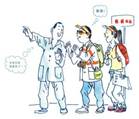网址:http://m.1010jiajiao.com/timu3_id_2390488[举报]
根据对话内容,从方框内选择恰当的句子填入对话相应的空白处,使对话完整,合乎情景(有两个多余选项)。
A:Excuse me,sir.(1)_________
B:Sure.What can I do for you,young man?
A:(2)_________ So our class want to go on a trip.I'd like to look for some sightseeing information.I want to know if you have a one-day tour.
B:Of course we do.We have many such tours.(3)_________
A:Well,we are going to visit Hongyadong,Ciqikou,Gele Mountain and so on.
B:They are all interesting places in Chongqing.(4)_________
A:Well,today is Jan 22nd.And we still have another four days before the final exams.(5)_________
B:Oh,I see.
| A.We will be free the day after that. B.I want to ask you a question. C.When are you going to take the tour? D.Could you give me some help? E.What places arc you going to visit? F.We'll have a day off. G.We are going to fly there. |
根据对话内容,从A—G中选出可以填入空格内的最佳答案
A: Excuse me, sir. 1
B: Yes. What can I do for you, young man?
A: 2 Some of my classmates want to go to Beijing for a short visit. I’d like to look for some sightseeing information. I want to know if you have four days’ tour.
B: We certainly do. There are quite many such tours. 3
A: Well, we’re going to visit some famous places such as the Great Wall, the Summer Palace and so on.
B: They’re all places of great interest in Beijing. 4
A: Well, today is June 24。And we still have three more days before finishing the Junior Exam. 5
B: Oh, I see. Well, there are two kinds of tours: package(全包式)and self-service(自动式)
A: I think we’ll take the self-service.
B: All right. Here’s the information about the tour and it will help you.
A: Thank you very much.
B: You’re welcome.
[ ]
A.We will be free the day after that.
B.Can I ask you a question?
C.When are you going to take the tour?
D.Could you give me some help?
E.What places are you going to visit?
F.I’ll finish my school next month.
G.We are going to fly there.
查看习题详情和答案>>补全对话
阅读对话,从A~G中选出可以填入空格内的最佳答案,将字母标号填入题号空格内。
A: Excuse me, sir. 1
B: Yes. What can I do for you, young man?
A: 2 Some of my classmates want to go to Beijing for a short visit. I'd like to look for some sightseeing information (旅游信息). I want to know if you have four days' tour.
B: We certainly do. There are quite many such tours. 3
A: Well, we're going to visit some famous places such as the Great Wall, the Summer Palace and so on.
B: They're all places of great interest in Beijing. 4
A: Well, today is June 24. And we still have three more days before finishing the junior exam. 5
B: Oh, I see. Well, there are two kinds of tours: package (全包式) and self-service (自助式)
A: I think we'll take the self-service.
B: All right. Here's the information about the tour and it will help you.
A: Thank you very much.
B: You're welcome.
A.We will be free the day after that.
B.Can I ask you a question?
C.When are you going to take the tour?
D.Could you give me some help?
E.What places are you going to visit?
F.I'll finish my school next month.
G.We are going to fly there.
查看习题详情和答案>>
In English, just like in Chinese, we change the way we speak when talking with different people. The expressions you use might depend on whom you are speaking to or how well you know them. If you say to your teacher, “Where is my book?” this will sound rude. But if you say, “Excuse me, Mr West. Do you know where my book is?” your question will sound much more polite. On the other hand, it might be alright to say “Where is my book?” to the people you know well.
And you would not usually say, “Peter, lend me your pen.” A very direct order like this can sound rude in English. Usually in English polite questions are longer and include extra (附加的) language, such as “Could you please...?” or “Can I ask...?” It sounds more polite to say, “Peter, could you please lend me your pen?” If you stop a stranger in the street, we might first say, “Excuse me. I wonder if you can help me.” or “I’m sorry to trouble you but…” before asking him for help.
It might seem that speaking politely is more difficult than being direct, and in a way this may be true.
小题1:When we make requests, we need to speak in a ____ way.
| A.polite | B.careful | C.different | D.direct |
| A.Which is the way to the zoo? |
| B.How can I get to the zoo? |
| C.Do you know the way to the zoo? |
| D.Excuse me. Can you tell me the way to the zoo? |
| A.We should use long sentences when we ask for information and help. |
| B.When we ask for help from others, polite language must be used. |
| C.The way of speaking is important when we ask different people for help. |
| D.In English, polite questions are as neccessary as rude and direct ones. |